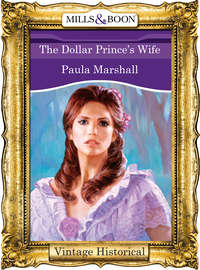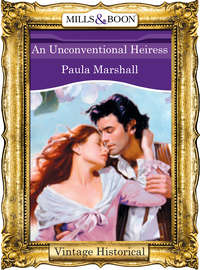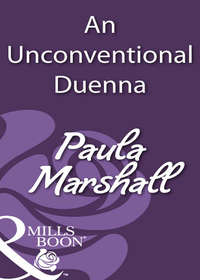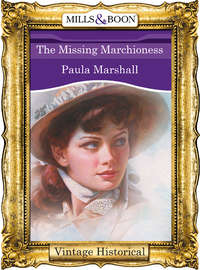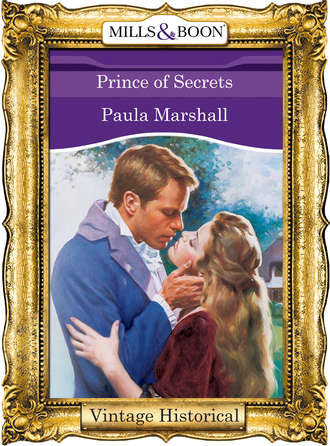
Полная версия
Prince Of Secrets
‘Mr Grant is to entertain us,’ he announced. ‘A Royal Command Performance, you understand. No gossiping.’
Violet made a moue, and Sir Ratcliffe looked displeased as the damned mountebank opened the case in which his guitar was kept and began to tune it.
‘Do you have any particular piece in mind, sir?’ Cobie asked, playing a series of quiet chords.
The Prince shook his head. ‘Nothing dismal, that’s all. I’m in no mind to be bored.’
‘Mmm.’
He thought a moment, then began to play, gently at first as his total recall brought back both words and music, the Lord High Executioner’s song from The Mikado.
I’ve got a little list, I’ve got a little list
Of society offenders who might well be underground,
And who never would be missed—who never would be missed!
The bored expressions on everyone’s faces vanished as his pleasant baritone wound its way to the end of the song. He finished with a flourish, bowing his head over his guitar. The Prince immediately began to applaud his virtuosity.
‘Oh, bravo, Grant, bravo. Better than all that stuff I have to endure with a straight face at the opera. Where did you learn to play and sing like that?’
Cobie bowed, amused that his talent with the guitar, although quite differently expressed, was entertaining the massed ranks of the British aristocracy and gentry as it had amused the outlaws at San Miguel so long ago.
‘At the Yale Glee Club, sir.’
‘It is to be congratulated—as are you. More, please.’
Cobie decided to offer something different.
He said, ‘This has to be done standing up,’ and began to play a Mexican love song, ‘La Paloma’, his guitar high on his shoulder. It was full of wild riffs, and he sang it first in Spanish, rolling the vowels liquidly on his tongue, and then in English.
The applause which followed was genuine. The Prince led it, then spoke to his wife, before turning to Cobie to say, ‘The Princess asks if you have a love song you would care to sing.’
He considered and, moved by something—perhaps it was Susanna’s face, sad in repose, reproaching him for having deserted her—said, ‘Yes, I think you would like this.’
So saying he sat down again and began to sing ‘Plaisir d’amour’, one of the most haunting and sad of ballads telling of love’s pleasures being short, but its pains, alas, being long and lasting a lifetime. His voice had changed again to match the music, and he sang it with all the feeling he could muster. It was almost as though he could feel Susanna’s pain, as though she had laid it on his back as a burden to be carried.
Perhaps, also, he thought, he was trying to tell Dinah something. He looked up once, to see her face, rapt, her eyes only for him. Slowly, slowly, as the song reached its sad end, he was suddenly in another room, far away in space and time, a room which knew nothing of kings and princes and nobility. In that room he had thought that in playing yet another elegiac tune he had finally said farewell to Susanna, but he might have known that their star-crossed love was not so easily renounced, and that Susanna’s pain still being with her, he was to be compelled to share it, even to the end.
The last notes died on the air. There was silence for a brief moment, before the Princess said, ‘Thank you, Mr Grant, that was beautiful,’ and began to clap, the rest of the audience following suit.
‘And that,’ said the Prince, ‘must be that. We thank the singer for his song,’
Only, a little later, he came up to Cobie, winked and smiled, murmuring, ‘When we go to the smoking room, shortly, bring your guitar with you. I have a bet that you have other songs to sing, even more entertaining.’
Which was a royal command. Sir Ratcliffe came up, flushed with drink, Susanna by him, and a few of his boon companions at his elbow.
‘Eh, well, Grant,’ he said, winking at his friends, ‘if all else fails, and the Stock Market falls through the floor, you can always earn a living on the pier at Brighton, what!’
‘I can think of worse ways of earning one,’ said Cobie coolly, refusing to return the insult, although Susanna’s mocking smile of pleasure at it cut him to the heart. He thought that drink was making Sir Ratcliffe unwary, besides ruining his complexion.
Susanna stayed behind for a moment, to whisper reproachfully, “‘Plaisir d’amour” was a most suitable song for you to sing, Cobie—except for one thing. You are highly qualified to speak of the shortness of love’s pleasure. The pains, however, you hardly seem to be acquainted with. You should leave singing of them to others.’
Cobie had a brief flash of total recall. He saw a lovely face, the face of a girl long dead, half-Yankee, half-Mexican, and thought that the pains of that lost love might be with him always. He said, quickly and urgently, ‘Susanna, I would like to speak to you about a serious matter.’
She looked at him, her face stone. ‘If it is about Sir Ratcliffe and me, you may spare yourself. Once and for all, we have done with one another. Let that be it. I want no sermons from the cheat and womaniser which you have become.’
It was useless. He bowed to her before she swept away. He saw Dinah coming, and thought bitterly, What damage am I doing to her, that she will end up by either reproaching me or hating me? I never thought that Susanna and I would come to this.
Dinah, her intuition working again, knew at once that, although his face was impassive, he was distressed. She said, ‘You sang beautifully, Cobie, but are you sure you wouldn’t like to leave early?’
He replied, almost roughly for him, ‘No, Dinah. And I have yet another royal command to obey. I am not ill.’
‘No,’ she answered him quietly. ‘And you don’t look ill. But remember what you once told me, “Appearances often deceive.” I think yours deceive me and everyone else tonight.’
‘Not you,’ he said, still rough. ‘You are learning from the book of life so rapidly, Dinah, that you will shortly be leaving me behind. For tonight accept that however I feel, I must do what I have to do, and that is obey the Prince’s orders. Something tells me that I have not finished this night’s work yet.’
Nor had he.
Some time later, walking into the smoking room, full of tobacco fumes, where the Prince, seated among his little court, was drawing gratefully on his cigar, after half an evening’s abstinence, he was greeted by men who were demanding to be entertained without the restraining presence of women.
Sir Ratcliffe, by now almost unbuttoned—Susanna and her husband had already retired—sprawled in a great armchair, a tot of whiskey in his hand while he watched Cobie play and sing ‘The Old Chisholm Trail’—in the half-expurgated version.
‘Bravo,’ he said languidly. ‘It seems I underrated you. The Music Hall in Brixton is your proper métier, my friend. Why not take yourself there?’
Before anyone could expostulate at such gross discourtesy, the red rage had Cobie by the throat. Not the complete thing, but something near. Regardless of whether Sir Ratcliffe might know of his secret plans to bring him to justice, he said rapidly, ‘I don’t underrate you, sir, and it occurs to me that I could sing a song about your spiritual home, your métier, which the company might enjoy.’
Without a pause he segued into ‘The House of the Rising Sun’, that notable folk ballad of a very young girl ruined in a brothel.
He sang it in the throaty, broken voice of the black American singer which he had heard on his one visit to the South, and which Dinah would have recognized because he had often used it when singing to her before or after lovemaking.
There was dead silence when he ended. Everyone present, including the Prince, knew of Sir Ratcliffe’s reputation with women; some even knew of his relationship with Madame Louise and Hoskyns, and his proclivity for girl children.
His face black with rage, he rose and, regardless of the presence of the Prince, exclaimed, ‘Damn you, Grant, I’ll not be insulted by upstart Yankees who have only their money to recommend them…’
His voice ran out as the man he was threatening, for he had raised his fist, remained impassive, eyes hooded, staring coldly at him.
Worse, he saw the expression of disapproval on the face of his master, his social arbiter, who ruled the world in which he lived and breathed, and which to be banished from meant in his present position not only social, but financial, ruin, for only Sir Ratcliffe’s friendship with the Prince kept the moneylenders at bay. If that went…if he strained the hold he had on him too far…everything would go…
The Prince was saying, in a freezing voice, ‘Be quiet, sir. You put an insult on Mr Grant. It is true that he returned the favour, but you were the provoker, he the provoked. We all thank Mr Grant for his playing tonight, and regret the discourtesy offered to him. Sir Ratcliffe, you will join me in this, I trust, and you, Mr Grant, we will forgive. We cannot rebuke the provider of such innocent pleasure.’
Sir Ratcliffe said sullenly—in the face of ruin he could do no else—‘I had not meant to annoy, a joke merely, sir.’
The Prince was severe. ‘In poor taste, your joke. You accept the apology, Mr Grant?’
Cobie said lightly, bowing his head. ‘Oh, I always accept apologies, sir. One of my few good habits.’ Which drew, as he had hoped and intended, a relieved general laugh.
The Prince spoke to him for a few moments about his singing and playing. Cobie told him, truthfully, that his best instrument was the piano. The Prince, his prominent blue eyes hard on him, said, ‘It seems that you are a man of many talents, Grant. Lady Kenilworth tells me that you sketch well. I know for myself that you are superb on a horse and, to cap it all, you have a gift for making money. You should come and instruct some of my subjects—we seem to be losing the talent.’
Cobie saw jealousy written plain on some of the faces around the Prince. He bowed, and murmured in his best and most innocent manner, ‘You know what they say, sir, Jack of all trades, master of none.’
The Prince’s gaze on him remained hard and shrewd, ‘Oh, I doubt that, Grant, I really doubt that. No matter. You have provided enough entertainment for one night. When we are at Markendale you must play the piano for us, and Lady Kenilworth will sing—her voice is lovely.’
It was his dismissal for the evening; pondering on the number of times Violet had walked into the conversation, he decided that the Prince probably knew of their brief liaison—and did not resent it.
His guitar in his hand, he wandered out of the smoking room and down a long corridor lined with the portraits of the great and mighty from a forgotten past. For some reason he did not want company—something which came over him at times. He wished to be alone, even if only for a little while, but his wish was not to be granted.
A voice behind him said in the drawl of the upper-class Englishman, ‘Your performance tonight was a polished one on both occasions, Mr Grant. I am not surprised that the Prince praised you for it. A man of many talents, he called you. I don’t think that he is aware of them all, do you?’
The speaker was the grey man, Hervey Beauchamp, who always stood at the Prince’s elbow. His tone to Cobie had a subtle ring of familiarity in it, as though he were speaking of things which they knew, and no one else did.
Cobie put on his most charmingly innocent face, and said, with no double meaning in his voice, ‘I thank you for the compliment, sir—but for the rest…’ and he raised his eyebrows slightly ‘…you have the better of me. I don’t think we’ve ever been formally introduced…although you once waited on my wife…’ He let his voice trail off.
‘Masterly, sir, masterly,’ said the other approvingly—but did not say what was masterly. They were standing before a portrait of Prince Rupert of the Rhine, painted by some unknown artist.
‘My name—not that it is of the slightest importance—is, as you know, Beauchamp. One of my ancestors came over with the Conqueror and ever since we like to think that we serve our sovereign as faithfully as he did.’
He waved a hand at the portrait so that Cobie wasn’t sure whether he meant Prince Rupert, the loyal supporter of two Stuart Kings, or his own distant progenitor.
Since something seemed expected of him, he offered, again with all the naïve charm he could muster, ‘I cannot repay you by offering a similar remarkable ancestry—my own being remarkable only in that, like many Americans, I have none. I am newly invented.’
The grey man laughed. ‘Well said, and I should have expected such an answer. Come, Mr Jacobus Grant, who possesses the face of the Hattons, but denies any connection with them, what moves a man like yourself to action? The philosophers whom I read tell me that newly invented men make their own laws since those which already exist mean nothing to them, being the work of men invented long ago. Do you make your own laws, Mr Grant, and in consequence carry out trial and sentence according to them—even in London?’
Cobie lifted his guitar. San Miguel and its outlaws would have recognised his expression. He began to play the song from The Mikado again. He let the words run out softly, keeping his guitar at the ready.
‘Like that?’ he queried sweetly. ‘What a romantic notion, Mr Beauchamp, sir. You should write novels.’
The grey man smiled. ‘Instead of living them,’ he said. ‘I must inform you that the Prince likes you, Mr Grant, genuinely likes you. Not just because you’re an American—he likes them all, you know. They do things. He was formed to do things, but was never allowed to. He will be an old man before he reaches the throne, which is a pity. The old woman who sits on it now has had her day but will not acknowledge it. Since he is a man who likes action, and is denied it, he becomes bored, and bored people make mistakes… It would be a pity if because of one of them he were to be passed over, reviled by a too-powerful Press.’
Cobie said nothing, played a few soft chords on the guitar. The tune was one he thought Mr Beauchamp might not know. It sang of passion and death—but in a frontier society, not this civilised one.
The grey man said, ‘As I am sure you are aware, His Royal Highness is quite unlike Sir Ratcliffe and his kind. His pleasures hurt no one. He takes them where he knows they will not offend. For him to have been indiscreet for once, does not mean that he deserves to be pilloried—only pitied because he may not act as other men do.’
Cobie’s hands were busy on the guitar. His brain was busier. Where was all this double-talk leading? What did this faceless man want with Cobie Grant? How much did the man know of Sir Ratcliffe and himself? He could not believe that the mention of Sir Ratcliffe’s name was innocent, after Beauchamp’s earlier hints of his possible lawless acts in London.
‘Come to the point,’ he said negligently. ‘I’m sure there is a point. Americans like to get to it quickly. We are blunt, sir, blunt.’
‘I have never seen anyone less blunt than your good self,’ answered the grey man, his voice dry.
‘That is because you don’t know me,’ and Cobie played a few bars of a Negro spiritual.
‘Oh, I know you, Mr Grant, and of your doings—both here and in the States. No matter, I will be plain. The Prince wrote some letters to a lady, whose husband suddenly became jealous, and took her from London, and into the country. Being a fool, he thought that might keep her chaste. She, also being a fool, kept the Prince’s letters, and took another lover—and showed him the Prince’s letters for him to laugh at.
‘He did more than laugh at them. He stole them, and now he blackmails the Prince with them, to keep himself in society, save himself from ruin. His Royal Highness has been generous…you understand me? But the thief grows careless, and behaves after a fashion which would have caused the Prince to—banish him, as it were. But he may not, because of the letters…
‘Now the man has become so indiscreet that he grows dangerous. Were his secret activities known he, being a friend of the Prince, would prove dangerous to the Prince, might even shake the throne. Cornered, he might try to use the letters to save himself—or even publish them, out of spite.’ He paused.
Cobie played a few slow bars of ‘God Save the Queen’, and said, as drily and anonymously as the man before him, ‘What has all this to do with me, sir?’
But he knew, he knew.
‘Why, I think you know the thief very well, Mr Grant. You have already dealt with one of his minions—and have plans for him, too.’ He began to hum the song from The Mikado which Cobie had treated him to earlier.
‘Need I say,’ he continued smoothly when he had finished humming, ‘that not only would you be satisfying yourself, and saving yourself from trouble, but you would also be doing the state some service if the Prince’s letters were…somehow…to be recovered…’
Cobie thought rapidly again. No one had disturbed them. He swung his head and looked down the corridor. Since the grey man had appeared the double doors at the far end had been closed—were probably locked, he thought. He had been tracked as carefully as though he were in the desert in Arizona, being followed by the law. He was, in effect, a kind of prisoner.
He laughed.
He murmured, his voice reproving, ‘The more things change, the more they remain the same. That’s the most delicate attempt to blackmail me into doing something that I have ever suffered. Tell me, does your master know of this—or of Sir Ratcliffe’s vicious life?’
The grey man smiled ironically. ‘It all depends which master you mean. If you are referring to the Prince, then my answer is, No.’
‘I thought not.’ Cobie shook his head. ‘You have read Francis Bacon, sir? I am sure you have. He said a number of things worthy of remembrance. He is particularly good on revenge, Mr Beauchamp, sir…’ The last phrase came out in his most insolent Western drawl.
‘He said that revenge is a kind of wild justice, and also that it is a dish best eaten cold. When I was very young, I agreed with him… When I was a little older—I was not so sure. Sometimes the best revenge is no revenge at all. What we do, Mr Beauchamp, sir, has consequences for us, as well as those to whom we do it. I will think your proposition over.’
The grey man hesitated. ‘That is your considered answer?’
‘I have no master but myself,’ replied Cobie negligently, ‘and therefore the only duty I owe is to myself, and to none other. No fear of demotion, no hope of promotion can move me, you understand, no threat to blast my reputation, either. I think that what you have found out about me is hearsay.
‘If I do what you want me to do, it will be because I want to do it, not because you are trying to blackmail me into stealing back the Prince of Wales’s letters—as Sir Ratcliffe is blackmailing the Prince. I don’t like blackmailers, Mr Beauchamp, sir, not even in a just cause. You must live in hope.
‘Now had you asked me, pat, as the Bard says, you might have gained a different answer.’
His smile was as provoking as he could make it.
The grey man said slowly. ‘I see that I have underestimated you.’ He paused, before asking, ‘Tell me one thing—out of curiosity, you understand, not to use against you. Is it true that you possess total recall? I have heard of such a talent, but I have never met anyone who genuinely possessed it.’
Cobie began to laugh. ‘Of course, if I told you the truth you would use it against me after some fashion. I know that because were the situation reversed I would use such a thing against you! Live in hope, Mr Beauchamp, sir, that you might one day find out. I have no intention of satisfying your curiosity at present.’
The grey man laughed with him, and for once his mirth was real. ‘I shall leave you now, Mr Grant. I hope that you will give me the answer I want, but I see that I must wait. Give me a few moments before you follow me.’
He turned away without waiting for a reply—and then turned back again.
‘By the by,’ he said, his smile shark-like, ‘I believe that we are cousins—distant, it’s true, but cousins. The Sir Beauchamp Hatton whom you and your uncle, Sir Alan Dilhorne, so greatly resemble, was named after my great-great-grandfather, his first cousin. Interesting, Mr Grant, sir, interesting?’
He was gone, leaving Cobie to reflect that Machiavelli’s Chance had been brought along, once again, like a horse ready for him to ride.
Chapter Two
‘E xactly like the other one, Lizzie Steele. But not thrown in the river this time, just dumped in an alley.’
Inspector Will Walker thought that there were some things in his line of work which he would never get used to, and examining the sexually mutilated bodies of murdered girl children was one of them.
He sighed. He could imagine the excited headlines in the new popular press, the criticism of the police for not being able to track the brutal murderer down. Just his luck that he should have been involved in the previous case.
‘Turns your stomach, don’t it, guv?’
Walker nodded wearily.
‘True, Bates. I shan’t rest until the beast who did this has been stopped. But it’s not going to be easy. No clues at all—other than that this one was killed and maimed exactly like the Steele girl was.’
‘So it wasn’t Hoskyns who killed Lizzie Steele?’ said Bates thoughtfully. ‘Do you think that the Ripper has come back from wherever he vanished to?’
Walker shook his head. Four years ago, in 1888, Jack the Ripper had stalked the East End, killing and mutilating prostitutes in the most gruesome manner. And then, as suddenly as they had started, the murders stopped.
‘No, Bates. This ain’t the Ripper’s handiwork. It’s a different way of going on altogether. No, this means another interview with our friend Mr Dilley. If it weren’t that he had an unbreakable alibi for the night Hoskyns was killed…’
His voice trailed off. He was a frustrated man these days. Things were not going well with him. He had walked upstairs only the day before to be told that his record of success in clearing up crimes was not good enough. He had wanted to retort that so long as he was not given proper back-up, his record would remain poor. But he held his tongue.
Now he had a multiple murderer on his patch. The similarity between this death, and that of Lizzie Steele was too great to believe that two men were involved. Dismally he had little doubt that this would not be the last body he would be called out to see…
A fortnight ago the word had come down from on high to lay off Mr Jacobus Grant, alias Mr Dilley, amateur magician and former outlaw. What a thing it was to have friends in high places, being his cynical reaction to that. On the other hand, he had to allow that, so far, he had uncovered nothing to support his belief that Grant was responsible either for the fire by the river or Hoskyns’s death.
But if Grant had thought that Hoskyns had murdered the girl, as well as procured her, what was he thinking now? Hoskyns dead, Madame Louise and the rest of her cohorts in prison—and a killer of girl children was still on the loose.
What magic trick could Mr Dilley answer that with?
Dinah sat at breakfast with Cobie. Their Sandringham excursion was safely over without any further trouble from Sir Ratcliffe or anyone else. Not that she was aware of Cobie’s session with Hervey Beauchamp.
Sir Ratcliffe had behaved himself after that first disastrous evening. The Prince had made it plain to him that he was no longer one of the favoured few around him, and he did not like that upstart Grant the more for that.
Part of him regretted the behaviour which had drawn the Royal wrath down on him because it meant that his rocky social position had become even rockier. He could only console himself with the thought that, as long as he possessed Tum Tum’s letters, the Prince could not banish him from high society by withdrawing his patronage completely.
On their last day in Norfolk the Prince had genially roared at the Grants, ‘I am looking forward to our rendezvous with you in the North, Lady Dinah. Make sure that husband of yours brings along all his musical instruments to entertain us. Lady K. tells me that he’s a devil on the banjo, too.’




